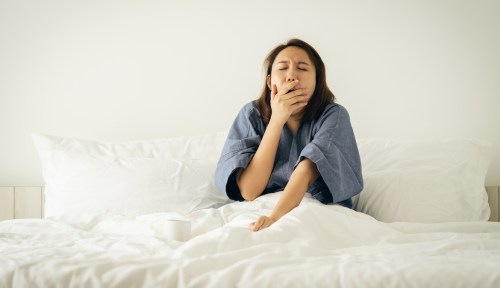7 Lesser-Known Effects of Sleep Deprivation, According to Sleep Experts
Quality sleep is for optimal wellness. Here, learn seven not-so-obvious sleep deprivation effects that experts want you to know.

When you’re yawning every three minutes at 10 a.m., you might think, I did not get enough sleep last night, and you may be right. Sleep is an integral pillar of well-being, and not getting enough of it can lead folks to be in less-than tip-top shape during their waking hours. And though the yawn example may be an obvious sign that “sleep improvement” could be a worthy item on your priority list, there are also some other surprising symptoms and effects of sleep deprivation to note and work to avoid as well.
Experts in This Article
sleep doctor and assistant clinical professor at Keck School of Medicine of USC
assistant professor in medicine at Harvard Medical School and associate scientist at the Brigham and Women’s Hospital
“Being sleep-deprived affects every single organ in the body,” says Raj Dasgupta, MD, FAASM, sleep expert and spokesperson for the American Academy of Sleep Medicine. “It could make depression [and] anxiety worse. It also affects your memory, recall, and accuracy.” For optimum sleep help, he says to consider both the number of hours you’re getting every night and whether or not those hours constitute quality sleep. To measure that quality, he suggests simply considering how you’re feeling the next day.
“Being sleep-deprived affects every single organ in the body.” —Raj Dasgupta, MD
Even if you feel okay, though, you might still be sleep-deprived. And from a personal and community-health perspective, it can still be beneficial to consider to all symptoms of sleep deprivation (even those that are less-than obvious).
“Sleep is so important for a host of different areas relating to personal health, but insufficiencies actually extract a significant concern from the standpoint of public health,” says Rebecca Robbins, PhD, sleep expert at sleep-tech company Oura, citing research of a risk for accidents when people haven’t gotten a good night’s rest.
Read on to learn seven lesser-known effects of sleep deprivation to be aware of, per the sleep experts
7 unsuspecting effects of sleep deprivation
1. A weak immune system
Have you ever noticed that you feel like you need more sleep when you’re sick? According to Dr. Dasgupta, that’s because “your immune system functions better when you’re sleeping,” and good-quality sleep is necessary for fighting an illness.
2. Imbalanced glucose levels
Homeostasis reflects the body being in physiological balance. One of the effects of chronic sleep deprivation, says Dr. Dasgupta, is that your glucose levels (or blood sugar) might be out of homeostasis.
3. High blood pressure
Sleeplessness is correlated with increased blood pressure levels, so it makes sense that chronic lack of sleep over time is likewise connected to cardiovascular issues and heart disease. “If you’re having a difficult time controlling your blood pressure, maybe the next thing to do before you add more and more medications is to look at your sleep,” says Dr. Dasgupta.
4. Diminished creativity
A common effect of sleep deprivation is brain fog, says Dr. Robbins, which can present as a feeling of being unable to concentrate. So, someone who doesn’t get enough sleep might have a hard time creating—whether that’s writing an email, painting a portrait, editing a film, or otherwise. And if that creative pursuit is connected to what they do for a living, other negative implications of the sleep deprivation may follow.
5. Riskier decision-making
One of the effects of sleep deprivation is making choices you wouldn’t make if you were well-rested, says Dr. Robbins. It can lead to one of those moments where you’re in a bad situation and find yourself thinking, How did I get here? The answer? Sleep-deprived people become more impulsive and prone to risk-taking during decision-making.
6. It takes a long time to realize you’re full
Per a study in the Public Library of Science, people who slept less had higher levels of ghrelin and lower levels of leptin, two hormones associated with appetite regulation. Leptin signals that you’ve had enough to eat, and when you’re sleep-deprived, its balance may be off; you may have more ghrelin, which tells you you’re still hungry, and less leptin in this case. “That causes the signal to the brain to be much slower than it would ordinarily, so you are going to be physiologically full before your brain realizes that,” says Dr. Robbins.
7. Increased reactivity
When you’re not sleeping enough, it’s possible that you may start reacting instead of responding in your interpersonal conflicts, says Dr. Robbins. “Our amygdala is much more likely to fire when we’re sleep-deprived,” she says.
What might that “fire” look like? Snapping at someone near you or being “less likely to do something that’s really important,” says Dr. Robbins. When you get the sleep you need, you’re able to take things less personally because your amygdala isn’t in overdrive.
Oh hi! You look like someone who loves free workouts, discounts for cutting-edge wellness brands, and exclusive Well+Good content. Sign up for Well+, our online community of wellness insiders, and unlock your rewards instantly.
Sign Up for Our Daily Newsletter
Get all the latest in wellness, trends, food, fitness, beauty, and more delivered right to your inbox.
Got it, you've been added to our email list.










